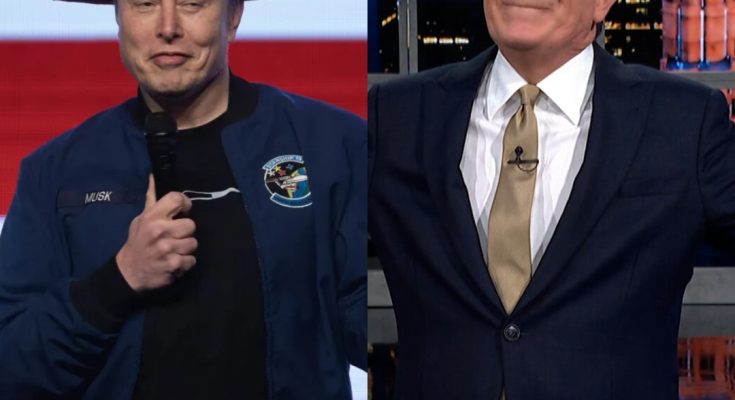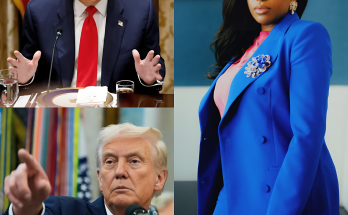In a night filled with sharp wit and comedic jabs, “The Late Show” host Stephen Colbert took aim at tech billionaire Elon Musk after his $25 million gamble in the Wisconsin state Supreme Court race went down in flames. The election, which saw liberal candidate Susan Crawford defeat conservative-backed Brad Schimel, became a focal point for Colbert’s late-night monologue, as he gleefully celebrated the outcome and poked fun at Musk’s expensive defeat.Elon Musk, known for his ventures in space exploration and electric vehicles, took a deep dive into political influence, spending millions of dollars to sway the Wisconsin Supreme Court race. Musk and Musk-aligned groups pumped over $20 million into supporting Schimel, a candidate whose values aligned with Musk’s right-leaning political stance.Musk’s financial intervention wasn’t limited to donations alone; he even made headlines by handing out $1 million checks to Wisconsin voters just days before the election. These extravagant efforts were meant to buy influence in the state’s judicial race and secure a conservative majority on the Supreme Court.However, despite Musk’s heavy investment and personal involvement, the election results were a resounding defeat for his chosen candidate. Crawford, a progressive candidate, won by a 10-point margin in a state notorious for tight elections.With her victory, the court retained its 4-3 liberal majority, ensuring that progressive rulings on key issues like abortion rights, voting laws, and gerrymandering would continue.Colbert wasted no time in seizing the opportunity to poke fun at Musk, whose vast financial resources failed to deliver the desired outcome. The comedian opened his monologue by celebrating Crawford’s victory, acknowledging that her win was crucial in maintaining the liberal majority on the Wisconsin Supreme Court.“A lot of folks are happy about this partly because it keeps the court’s 4-3 liberal majority,” Colbert said, with his signature sarcastic tone. “But mostly because it is terrible news for Elon Musk.”For Colbert, the defeat wasn’t just a political loss—it was an opportunity to mock Musk’s failed attempt to use his wealth to manipulate a state election. The comedian couldn’t resist taking jabs at Musk’s reaction to the result.“Spending all that money, spending all that cash, just to watch the whole thing burst into flames,” Colbert quipped. “Now he knows what it’s like to buy a Tesla.”The joke, a clear reference to Musk’s electric vehicle company, was a direct hit at the frequent criticisms of Tesla’s performance and its reputation for occasional technical issues. Colbert’s comparison to Musk’s prized company, known for its ambitious but sometimes glitch-ridden products, drew laughter from the audience and cemented the night’s theme of ridiculing the billionaire’s political loss.But Colbert’s roast didn’t stop there. The comedian took it a step further by emphasizing just how crushing Musk’s defeat was in the Wisconsin race. It wasn’t just that Musk’s candidate lost—it was the overwhelming nature of the defeat that made it especially bitter.“Musk didn’t just lose,” Colbert gloated. “He got crushed.”This statement perfectly encapsulated the sentiment surrounding Musk’s failed political intervention. Wisconsin is a battleground state with a history of razor-thin margins in elections, so a 10-point victory for Crawford was seen as a decisive rejection of Musk’s influence.Despite spending millions to shape the race, Musk’s preferred candidate was trounced at the polls, and his financial power couldn’t buy him the result he desired.Musk’s defeat came just days after he made an extravagant show of his involvement in the race, including handing out the $1 million checks. This publicity stunt, which was intended to garner attention and sway voters, backfired, drawing criticism from opponents who accused Musk of trying to buy the state’s judicial system.“Looks like the only thing Musk’s money managed to buy was a ticket to a very public loss,” Colbert continued. The late-night host, whose show frequently covers political topics with humor and satire, didn’t let Musk off easy. The billionaire’s attempt to influence state politics through financial might was painted as a colossal failure, and Colbert was quick to rub it in.While Colbert’s jokes provided much-needed comic relief in the aftermath of Musk’s loss, there’s a deeper political significance to the outcome of the Wisconsin Supreme Court race. For Musk, this defeat represented a broader failure to control the political landscape with his wealth. It was not just a blow to his candidate, Schimel, but a message about the limits of financial influence in a democracy.In recent years, there has been growing concern over the role of money in politics, with billionaires like Musk using their vast fortunes to shape elections and public policy. Musk’s failed attempt to buy a Supreme Court seat in Wisconsin is a stark reminder that even the wealthiest individuals can’t always impose their will on the electorate.The Wisconsin race was a microcosm of the ongoing battle over the role of money in democracy, particularly when it comes to state-level elections. While Musk’s financial clout gave him a strong advantage in terms of resources, it ultimately couldn’t overcome the will of the voters, who resoundingly rejected his influence.The victory for Crawford and the preservation of the liberal majority on the state’s highest court send a powerful message about the resilience of democratic institutions, even in the face of overwhelming financial power.While Musk’s defeat in Wisconsin is a moment of reckoning, it’s unlikely to deter him from future political involvement. The billionaire has long been an outspoken figure in both business and politics, and his ties to President Donald Trump have made him a polarizing figure in American politics.Musk has shown time and again that he is not afraid to leverage his wealth and platform to push his political agenda, whether through direct donations, public statements, or financial support for candidates.In fact, Musk’s influence in politics may only grow in the coming years as he continues to be an influential voice in debates on technology, business, and public policy. Whether it’s supporting conservative causes, advocating for deregulation, or backing candidates who share his views, Musk’s political spending is likely to remain a feature of his public persona.However, the Wisconsin Supreme Court defeat could serve as a wake-up call for Musk and others who attempt to influence elections through sheer financial power. The results underscore the importance of grassroots activism, voter engagement, and the power of ordinary citizens to make their voices heard, even in the face of immense financial resources.Musk’s $25,000,000 loss in Wisconsin serves as a cautionary tale for other billionaires looking to play a direct role in shaping elections. While money can certainly buy advertisements, campaign events, and even voter incentives, it can’t buy the trust and support of the people.This defeat proves that, despite the growing influence of wealth in American politics, voters still have the ultimate say in the direction of their state and their country.In the end, the Wisconsin race will be remembered not just for its high-stakes nature but for the way it exposed the limits of billionaire influence in politics. For Colbert, the defeat was a moment of pure joy—a victory for democracy and a crushing blow to the idea that money can control the courts.As the dust settles from Musk’s costly attempt to influence the Wisconsin Supreme Court race, the late-night host summed it up perfectly: “Now he knows what it’s like to buy a Tesla.” For Musk, this defeat may just be the most humbling purchase of all.
H0T: Elon Musk’s $25,000,000.00 bet in Wisconsin went up in flames, and Stephen Colbert had the perfect roast: “Now he knows what it’s like to buy a Tesla.”

Block 1


